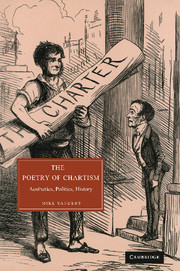Book contents
- Frontmatter
- Contents
- Acknowledgements
- CAMBRIDGE STUDIES IN NINETEENTH-CENTURY LITERATURE AND CULTURE
- Introduction
- 1 The Chartist imaginary: ‘talking by turns of politics and poetry’
- 2 Chartist poetry and literary history
- 3 ‘A jackass load of poetry’: the Northern Star's poetry column 1838–1852
- 4 Insurrectionary sonnets: the ideological afterlife of the Newport uprising
- 5 ‘Merry England’: memory and nostalgia in the year of the mass strike
- 6 ‘The future-hastening storm’: Chartist poetry in 1848
- 7 Constellating Chartist poetry: Gerald Massey, Walter Benjamin and the uses of messianism
- Appendix A Three Chartist poems
- Appendix B Details of poetry published in the poetry column of the Northern Star
- Bibliography
- Index
2 - Chartist poetry and literary history
Published online by Cambridge University Press: 11 July 2009
- Frontmatter
- Contents
- Acknowledgements
- CAMBRIDGE STUDIES IN NINETEENTH-CENTURY LITERATURE AND CULTURE
- Introduction
- 1 The Chartist imaginary: ‘talking by turns of politics and poetry’
- 2 Chartist poetry and literary history
- 3 ‘A jackass load of poetry’: the Northern Star's poetry column 1838–1852
- 4 Insurrectionary sonnets: the ideological afterlife of the Newport uprising
- 5 ‘Merry England’: memory and nostalgia in the year of the mass strike
- 6 ‘The future-hastening storm’: Chartist poetry in 1848
- 7 Constellating Chartist poetry: Gerald Massey, Walter Benjamin and the uses of messianism
- Appendix A Three Chartist poems
- Appendix B Details of poetry published in the poetry column of the Northern Star
- Bibliography
- Index
Summary
1848, John Saville's study of what is still thought of as Chartism's final flourish, examines the processes by which Chartism was destroyed both as a political movement and as cultural memory:
Chartism was finally broken by the physical force of the state, and having once been broken it was submerged in the national consciousness, beneath layers of false understanding and denigration. A radical movement draws essential sustenance from the inspiration of its past struggles and its past heroes; but who was to honour poor half-mad O'Connor on Kennington Common, leading his gullible followers to ridicule and execration? What was quite forgotten was the strength that continued in the Chartism in the months that followed the events of 10 April, and even the memory of the mass arrests and jailings were wiped from public memory. The contemporary agencies of the media were extraordinarily effective in traducing this greatest of all mass movements of the nineteenth century: but when all is said the almost complete obliteration of Chartism from public consciousness in the middle decades of the century remains a remarkable phenomenon.
It is difficult to resist the conclusion that the cultural legacy of Chartism has been suppressed with even greater effectiveness.
At first sight the history of Chartist poetry appears as a sad tale of ever-increasing obscurity: a brief moment of florescence lasting little more than a decade quickly followed by oblivion.
- Type
- Chapter
- Information
- The Poetry of ChartismAesthetics, Politics, History, pp. 38 - 68Publisher: Cambridge University PressPrint publication year: 2009



